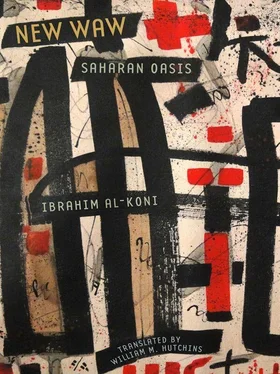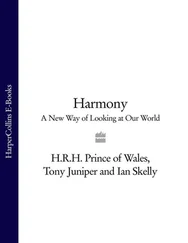He heard the youngsters discussing old age, using the word “ amghar ” more than once, 5and did not know whether they were talking about the bird or him.
6
The diviner approached, and they discussed, again, the beauty of old age and the nobility latent in every sorrow.
The diviner squatted down beside the leader and pursued the mirage into the wasteland, following it till it swallowed the horizon and turned into tongues of diaphanous flame. He picked up a pebble and threw it toward the bird. Then he, as he usually did, made straight for his point from the farthest reaches of the earth. “I’ve never seen another bird so tame around people from day one.”
The leader tossed out some scraps of barley bread, but the bird felt dispirited and became increasingly downcast. He cowered and gazed at the bread crumbs without any interest. Then he closed his eyes and hid his head between his wings. The leader said, “He was forced to act this way against his will. He acts tame because he is alone, deserted, and lost — lost like us. Moreover, don’t forget that he’s old. The secret lies in his advanced age. Old age is ugly. Does the Law discuss anything uglier than old age?”
The diviner smiled. He circled the topic and hovered around the point, although he continued to explore the ends of the earth. “I fear that what the Law says about old age disagrees with my master’s statement.”
“I know you will lead me to the ancient kingdom to tell me about the beauty of sorrow once again. Or am I wrong?”
“You’re right, Master. But I don’t derive my views about old age and sorrow only from the satchel of the Law. Our forefathers were the first to pass down this maxim. It is the forefathers who said that the sorrow of old age is noble and that there’s nothing more beautiful in the desert than a sorrowful person. Didn’t my master disapprove of the guffaws of the masses? Didn’t my master expel Ababa from the council a few days ago when an audible laugh escaped from him? Did my master do that out of respect for the Law of Dignity or from fear of the Law of Wisdom?”
“But don’t you consider the sorrow you discuss to be the end’s shadow? Don’t you think it is death’s specter?”
“If it weren’t the end’s shadow, we wouldn’t discover in it beauty’s shadow. If it weren’t death’s specter, we wouldn’t see in it nobility’s specter. The secret is always in death.”
“Why do desert people sing the praises of the end? Why did the forefathers bequeath to us a complete Law in praise of death?”
“Because they, Master, learned from experience that there is nothing so worthy of worship as death. They worshiped it not because it is the desert’s only truth and not because it is the only antidote with which they treated the ills of yearning and the pains of the desert, but the secret, Master, is in their longing for the secret, because death is a secret, and they longed for nothing so much as they longed for the secret.”
The leader tossed out some crumbs and shook off his lap. He followed the effusion of the mirage in the wasteland. He said, “Do you mean they worshiped death, wishing for death, because it would disclose to them the secret of the Spirit World?”
“Now my master is drawing close to the secret.”
“But how would it help them to discover the secret after it was too late?”
“The truth, Master, the truth! Truth is the consolation.”
“Don’t you think it stupid for man to seek death so he can know for certain that beyond the gloom he will meet a god?”
“Do you want them to be satisfied with life in these dead boundaries? Isn’t that more heroic than life in the boundaries of the mute desert?”
“I want them to be satisfied with what they’ve been granted. I want them to be satisfied with life within the boundaries of life.”
“Does my master want a life without truth?”
“Why do you all persist in looking for truth in the Spirit World?”
“Because, Master, that’s the only place that truth exists. The only truth, Master, is in the Spirit World.”
“How harsh that is!”
The leader picked up a pebble and muttered, “How harsh that is.” Throwing the pebble aside, he continued, “Let’s return to the bird. I heard the lads say he doesn’t belong to the tribe of abil-bil birds.”
The diviner descended from his heights and approached the source. From his pocket he drew snares to bag the point. “Whether the bird is an abil-bil or another similar species, according to the Law it is a messenger.”
The leader fell silent. So the diviner continued setting his traps. “The birds have begun to migrate. Since this bird refused to migrate, that is a bad omen, Master.”
The leader’s eye gleamed with a smile. Did the leader smile because he had discovered the site of the trap? Did he smile because he had realized that the sole reason for the diviner’s visit was to continue the previous day’s discussion about the need to migrate? He asked, “How can you expect him to migrate when he’s old? How can you expect him to fly when the earth has tethered him with chains and his wings are broken?”
“The bird is a migratory creature, and a migratory creature must migrate, even if he is old, because he will contravene his nature and contravene the law of things if he doesn’t. Migration is his destiny, Master.”
“But old age cripples the body, addles the mind, and tethers the poor creature to the earth with iron chains. So how can it explore the sky and join the celestial caravan? Search your Law for another path for it; don’t ask the poor creature to oppose the will of our mother, the desert.”
The diviner took another step closer to the site and struck his hands together. He said, “O God of the desert! Does my master think that the bird is this senile? Doesn’t my master see that the bird has refused to fly not because he can’t fly but because he is carrying a prophecy to the encampment?”
Their eyes met. The two men faced off at the mysterious site. They circled round the source that is the only destination for the community of diviners when they embark on their quests. It is a shadowy spring, a melancholy source they refer to in their arcane jargon as a sign.
The diviner saw that the leader had discovered the site and shouted, “Old age is truly a noble homeland, Master, but it’s an ailment that does not yet threaten my master’s body.”
The leader turned his eyes far away. He smiled and returned to the wasteland, to the playful mirage in the wasteland. He smiled for a long time. He smiled because he had discovered the diviner’s secret, his secret reason for visiting. He had known the diviner would arrive shortly. He had known the diviner would come as a messenger from the Council of Wisdom. He had known that they would not let the matter drop easily. He had known that they would come to him individually and in groups, evenings and nights. He had known that they would not oppose him on any matter, but also that they would not yield easily, especially when the matter related to a dictate of the Law, especially when the matter related to a practice that had helped mold them since they were born and had become a religion for them, especially when the matter related to migration. He had excused them, understanding that they were right to struggle desperately to obey a command they had inherited from their grandfathers and had read in their laws, a dictate that had coursed through their blood till it became their life. But he knew as well that they did not know in which land he stood, in which desert he had found himself during recent years, and what it means for a man to discover overnight that everything he has done in life is lost, that everything he should not have done is what he has done in life, and that what he has not done, he will never be able to do, because his time is disappearing faster than he expected, what he thought was life, what he had depended on, had ended before it began, had ended at the time he had planned to begin, indeed, even before he planned to begin. He was discovering that life had passed in the hour he was preparing to begin life — what trivial people call life. Now they wanted him to move about like in the old days. They wanted him to stock up on poems of longing, to set his sights on the stern, shadowy, indifferent horizon and rush off, to dart away toward the horizon in search of what lay beyond the horizon, to hurry off toward the horizon in search of the lost oasis that he knew he would never find. He was duty-bound to hope it existed if he wanted to continue playing, because this was the basis of the game. Whenever the horizon disclosed a void — an expanse, another horizon even less forgiving, even more murky, even more cunningly indifferent — he fought back the lump in his throat, cursed Wantahet both privately and publicly, 6and diverted himself with songs of grief, because the nomad contents himself with the Waw he finds in poetry once he discovers that this perfect oasis does not exist on earth. But old age mocks every deception and sees what all nomads fail to see. It sees what the diviner does not see. It sees what the Law itself does not see. This is the secret of old age. This is the secret of the sorrow that the diviner saw in the old man’s eye and called beautiful.
Читать дальше












